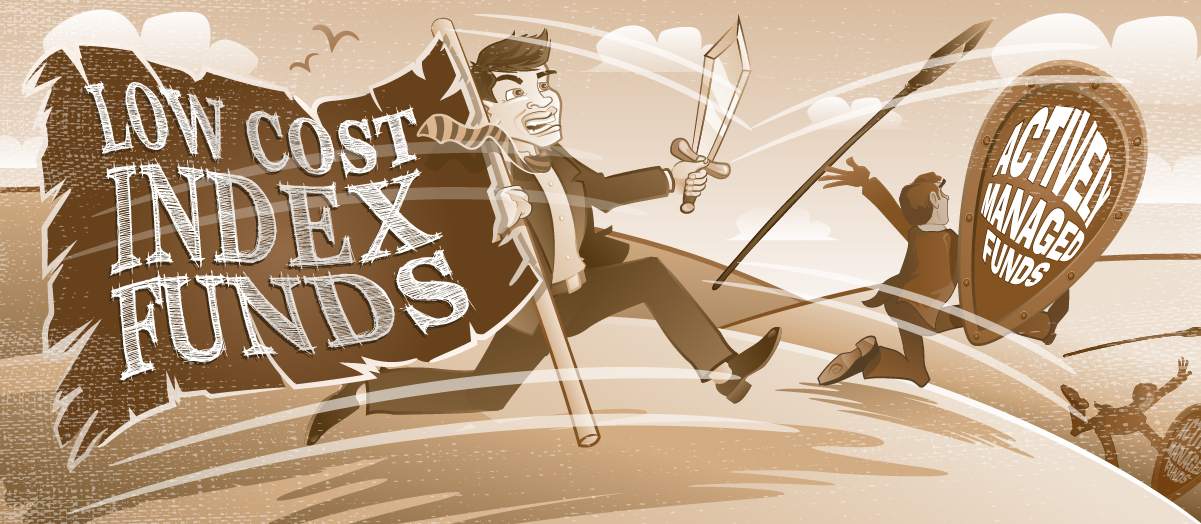
Andrew Hallam
20.05.2020
Why Do Index Funds Beat Actively Managed Mutual Funds?
_
Warriors with “actively managed funds” blazoned on their chests brought their spears out to fight. On the other side, academics raised flags in support of low-cost index funds.
The war ended years ago. Index funds won. But plenty of commission-hungry folk hope you didn’t get the memo. Perched behind mahogany desks in gleaming corner offices, they still hope to dupe investors into buying actively managed funds.
But why do index funds win? To say, “They charge lower fees,” doesn’t tell the total story. It doesn’t help new investors defend themselves against commission-hungry sharks (and innocent, well-meaning rookies who just get paid to sell).
Index funds beat actively managed funds. This happens when stocks rise. It happens when stocks go sideways. And it happens when stocks fall. Here’s why: Assume the stock market gained 5 percent this year. An index fund that tracks the return of that market would have earned 5 percent before fees. Such fees might be as low as 0.03 percent.
Now here’s where it gets interesting. Every actively managed dollar in that market would have earned 5 percent (before fees) as well. In other words, if we averaged what every day trader, every hedge fund manager, every actively managed mutual fund, every pension fund and every endowment fund earned in U.S. stocks that year, they would have earned 5 percent before fees too.
That’s because the market’s return always reflects the return of the money that is invested in that market. Active traders cannot, as a group, beat the market because they represent that market. That’s irrefutable, much like one of Newton’s laws.
So, to beat a stock market index, an active manager must beat the aggregate return of their actively managed peers after fees. When a professional trader beats the aggregate returns of his or her peers, that’s tough enough. But to beat an index, the professional trader must beat the pre-fee aggregate return of other professional traders, even after deducting his or her fees. The first part is tough. But the second part is tougher.
Assume the U.S. market earns 5 percent in a given year. The aggregate return on stocks for all professional traders would have been 5 percent that year. If an actively managed fund charged 1.4 percent, and the fund earned 6 percent before fees, then a 1.4 percent fee would erase 23.3 percent of the pre-fee profit. In other words, to beat the stock market index, this fund would have to beat its actively managed peers by 23.3 percent before fees.
From time to time, this active manager might succeed. But as Sylvester Stallone’s character, Rocky said to his young, boxing apprentice, “Time is undefeated.” And the low-cost index fund represents relentless time.
According to SPIVA, over the 12 months ending December 31, 2019, 71.12 percent of actively managed European stock market funds underperformed the S&P Eurozone BMI index. Over the past five years, 89.15 percent of actively managed European funds lost to the European index. And over the past ten years, a whopping 90.68 percent of them underperformed the index.
It was even worse for European fund managers who ran funds with U.S. stocks. Over the ten-year period ending December 31, 2019, 98.21 percent of them underperformed America’s S&P 500 index. Actively managed European fund managers didn’t fare better with their diversified global funds. Over the same ten-year period, a jaw-dropping 98.29 percent of them lost to the S&P Global 1200 Index after fees.
The stock market fell in 2008 and 2018. But during those years, most actively managed funds still underperformed their benchmark indexes. As with Newton’s law of gravity, they must. For example, in 2008, 64.9 percent of U.S. actively managed funds underperformed the S&P Composite 1,500. In 2018, 68.8 percent of them underperformed the index.
That does leave, however, some actively managed funds that did beat the market. In some cases, they find short-term fortune when buying winning stocks. Other times, they get lucky timing the market, moving into cash just before a market crash. But based on the SPIVA Persistence Scorecard, funds that win during one time period rarely repeat their winning ways.
You could find plenty of actively managed funds that have beaten the market index over the previous ten years. If I were selling actively managed mutual funds, I might say, “You see… it’s easy to beat the index. Check out these winning funds.” But, as I’ve explained here and here, funds with long winning records revert back to the mean. That happens for hedge funds too, which I’ve explained here, here and here.
Over your lifetime, you can easily trounce the performance of most professional market traders after fees. A diversified portfolio of low-cost index funds puts time in your corner.
And time is undefeated.
Andrew Hallam is a Digital Nomad. He’s the author of the bestseller, Millionaire Teacher and Millionaire Expat: How To Build Wealth Living Overseas
Swissquote Bank Europe S.A. accepts no responsibility for the content of this report and makes no warranty as to its accuracy of completeness. This report is not intended to be financial advice, or a recommendation for any investment or investment strategy. The information is prepared for general information only, and as such, the specific needs, investment objectives or financial situation of any particular user have not been taken into consideration. Opinions expressed are those of the author, not Swissquote Bank Europe and Swissquote Bank Europe accepts no liability for any loss caused by the use of this information. This report contains information produced by a third party that has been remunerated by Swissquote Bank Europe.
Please note the value of investments can go down as well as up, and you may not get back all the money that you invest. Past performance is no guarantee of future results.
